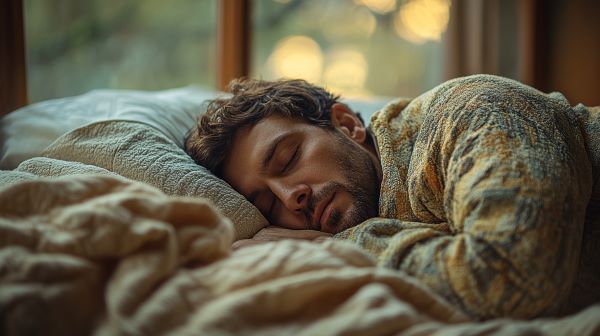Many people enjoy a glass of wine in the evening to unwind. Some believe it helps them fall asleep faster. But does wine really improve sleep?
While wine may help you feel drowsy at first, it often leads to poorer sleep quality overall. Alcohol can make you fall asleep quicker, but it disrupts your sleep cycle later in the night. This leaves you feeling less rested in the morning.
Wine and other alcoholic drinks can cause more frequent waking, nighttime bathroom trips, and lighter, less restorative sleep.
For better sleep, experts recommend avoiding alcohol close to bedtime. Instead, try relaxing activities like reading or gentle stretches to prepare for a good night’s rest.
Impact of Wine on Sleep Patterns
Wine affects sleep in complex ways. It can make falling asleep easier but often leads to poorer quality rest. The effects vary based on amount consumed and individual factors.
Understanding Sleep Cycles and Alcohol’s Effects
Sleep cycles consist of different stages, including light sleep, deep sleep, and REM sleep. Wine disrupts these normal patterns.
Initially, alcohol can decrease the time it takes to fall asleep. However, as the body metabolizes alcohol, sleep becomes more fragmented.
Wine reduces time spent in REM sleep, which is crucial for memory and learning. It also decreases deep sleep, the most restorative stage.
People may wake up more often during the night after drinking wine. This leads to less restful sleep overall.
The Relationship Between Wine and Sleep Disorders
Regular wine consumption can contribute to or worsen sleep disorders. Insomnia is a common issue linked to alcohol use.
Wine can increase the risk of sleep apnea by relaxing throat muscles. This leads to more frequent breathing interruptions during sleep.
Some people use wine as a sleep aid. This can create a cycle of dependence and worsen existing sleep problems.
Alcohol intake should be minimized for better sleep. While it may help with falling asleep, it often causes more sleep issues throughout the night.
Wine’s Chemical Influence on Sleep
Wine contains compounds that may affect sleep patterns. These substances interact with the body’s sleep-wake cycle in complex ways.
Resveratrol and Sleep
Resveratrol is an antioxidant found in red wine. It may help improve sleep quality. Research suggests resveratrol can reduce inflammation and oxidative stress.
These effects could promote better sleep. Some studies indicate resveratrol might increase slow-wave sleep. This is the deepest stage of non-REM sleep.
Resveratrol may also affect circadian rhythms. It could help regulate the body’s internal clock. This might lead to more consistent sleep patterns over time.
The Role of Melatonin and Alcohol
Wine contains small amounts of melatonin, the body’s natural sleep hormone. Melatonin helps regulate sleep-wake cycles. The melatonin in wine might contribute to feelings of drowsiness.
However, alcohol in wine can disrupt sleep. It may help people fall asleep faster but often leads to poorer sleep quality. Alcohol can:
- Reduce REM sleep
- Cause more frequent awakenings
- Lead to less restorative sleep overall
The sedative effects of alcohol typically wear off after a few hours. This can result in sleep disruptions later in the night.
Health Implications of Wine as a Sleep Aid
Drinking wine before bed can affect sleep in complex ways. It may help some people fall asleep faster but often reduces overall sleep quality.
Moderation and Sleep Quality Trade-offs
A glass of wine in the evening acts as a sleep aid for many. It can make people feel drowsy and fall asleep more quickly. But alcohol disrupts sleep cycles later in the night.
Wine leads to more wake-ups and less restorative deep sleep. People may spend more time in light sleep stages. This results in feeling less rested the next day.
The effects depend on the amount consumed. One small glass may have minimal impact. Larger amounts are more likely to harm sleep quality.
Long-Term Risks of Alcohol Consumption Before Bed
Regular use of wine as a nightcap can lead to problems over time. The body may develop a tolerance, requiring more alcohol to achieve the same sleepy effect.
This can increase the risk of alcohol dependence. Excessive alcohol use is linked to serious health issues like liver disease and cancer and possibly lead to alcohol addiction.
Nightly drinking may worsen sleep disorders. It can increase snoring and the risk of sleep apnea. This causes breathing problems during sleep.
Long-term poor sleep quality is tied to many health risks. These include obesity, diabetes, and heart disease.
Practical Considerations and Alternatives
While wine may seem like a quick fix for sleep issues, there are important factors to consider. Other approaches can improve sleep without alcohol’s downsides.
When to Consult a Sleep Specialist
Sleep problems can stem from many causes. A sleep specialist can pinpoint underlying issues affecting sleep quality. They may look at your circadian rhythm and biological clock function.
Specialists can diagnose conditions like sleep apnea or parasomnias. These include sleepwalking and vivid dreams. Proper treatment improves sleep and daytime alertness.
See a doctor if sleep troubles last over a month. Other red flags are loud snoring or stopping breathing at night. Extreme daytime sleepiness is also a concern.
Non-Alcoholic Relaxation Techniques
Many relaxation methods can help prepare the body and mind for sleep.
Deep breathing calms the nervous system. It slows heart rate and eases muscle tension.
Progressive muscle relaxation involves tensing and releasing muscle groups. This reduces physical stress that can keep people awake.
Gentle yoga or stretching before bed loosens tight muscles. It can also quiet a busy mind.
Meditation and mindfulness teach focus on the present moment. This can stop racing thoughts that delay sleep onset.
Calming music or nature sounds mask disruptive noises. They create a peaceful sleep environment.
These techniques support the body’s natural sleep-wake cycle. Unlike alcohol, they don’t disrupt sleep stages or cause morning grogginess.
